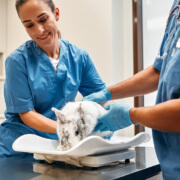Our tips to work smarter, and reduce stress
We’re used to being asked: “Are you okay?”, to which our response is typically a completely automatic; “Yes, thanks”. But we probably wanted to say “Busy, stressed, and overworked”, and maybe a few other choice words – but we rarely have the luxury of saying that!
According to Eurostat, the average UK employee works 42.5 hours a week, one of the highest in Europe. If you’re like most veterinarians, you’re probably clocking well over this figure, and with that comes stress – the feeling of being ‘busy’ can cause stress leading to burnout. So below are our tips to improve stress levels in the practice.
1. Plan more
Before starting a task or project, start by taking a step back to review the whole scope. Do you have all the relevant details, is the workspace correct, do you know who needs to be involved? For example, consider an operation: do you have all the instruments ready, or do you have to dig around in a drawer to get what you need?
2. Know when you are most productive
Everyone is different; are you a morning person, or a night-owl? There is no right or wrong time for maximum efficiency, but it is essential to consider which task is best at what time. It’s not always possible in practice, but consider blocking fixed time for tasks such as updating owners, updating patient cards, or creating practice marketing materials.
3. Avoid distractions
Browsing the internet and checking out social media are notorious time wasters, so create boundaries for yourself. A mobile phone can increase efficiency when appropriately used, for example, for quick access to e-mail, messaging applications and other means of communication. But be aware of being drawn into distracting apps, and consider turning off attention-grabbing ‘push notifications’.
4. Divide and conquer
Sometimes it seems easier to do everything yourself. Still, in the end, this is rarely true – especially as an addition to your regular workload. By dividing tasks, delegating work and training colleagues, you free up more time for yourself even if it takes some time and patience initially.
5. Look for solutions (in your veterinary software)
Many of your daily tasks are repetitive, and perhaps even unnecessary. For example – does your practice management software offer a smarter solution? Think, for instance of clinical protocols, reminders or even handling phone calls – modern practice software should automate these while increasing their efficiency. For example, automated text messages updating pet owners after a treatment, or linking your phone system to your software to automatically bring up a patient record.
Stress and pressure often arise when tasks don’t go as planned. Consider not completing a patient’s surgery prep; a surgical team is kept waiting, which in turn affects the rest of the days planning – appointment cancellations, and longer waiting times. Patient Workflow Software can help with this, allowing your practice to maintain a tight schedule with a clear visual overview, reducing time pressures, interruptions, and stress.
Let’s talk about what IDEXX software can do for your practice
Complete the form below and we’ll get back to you.







